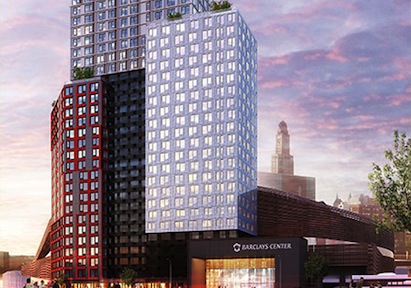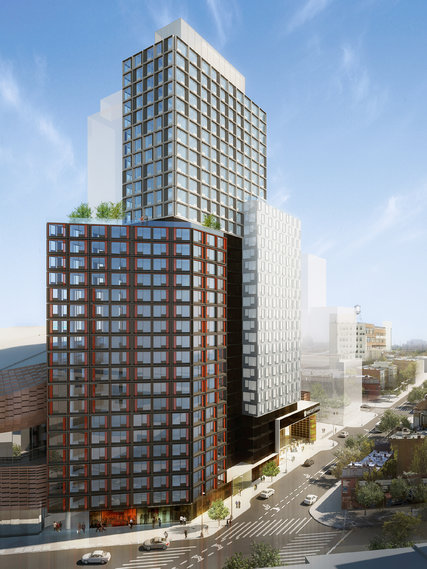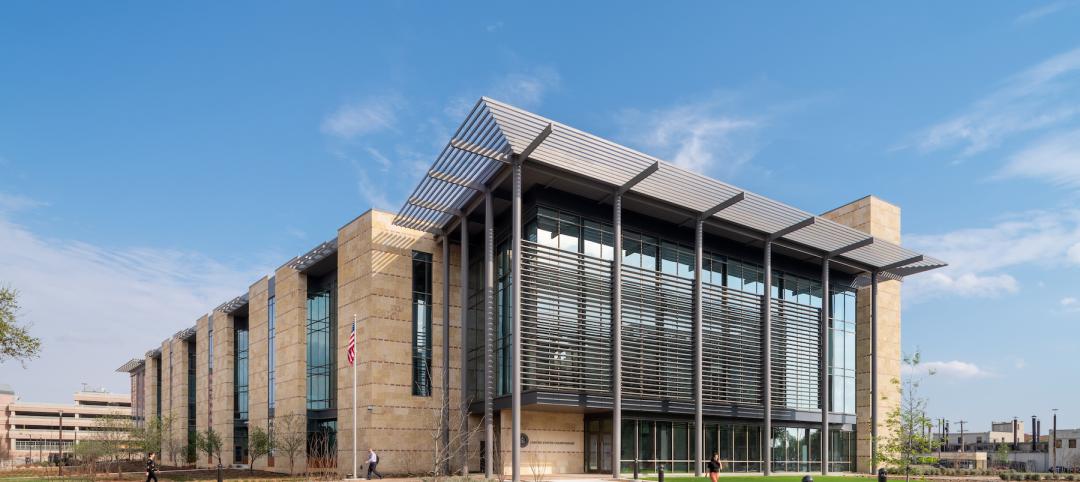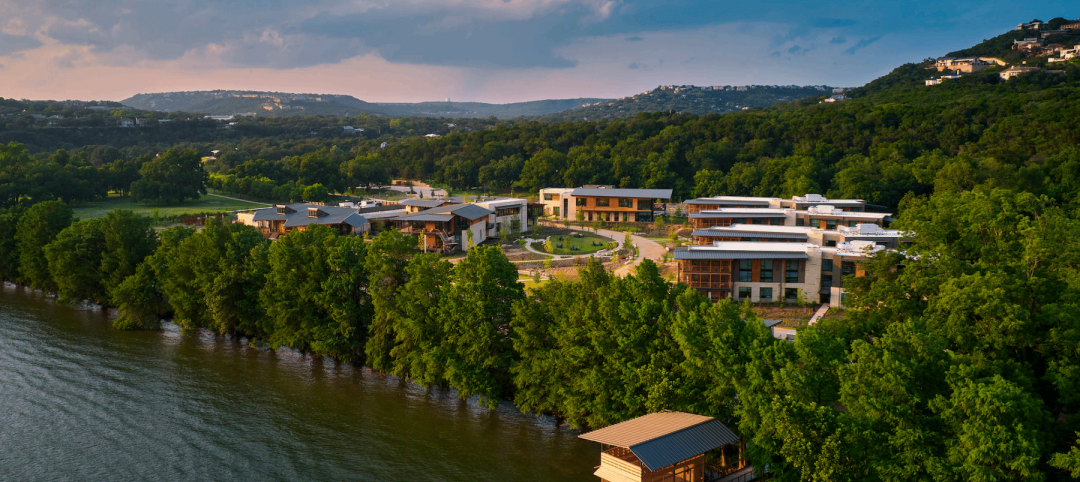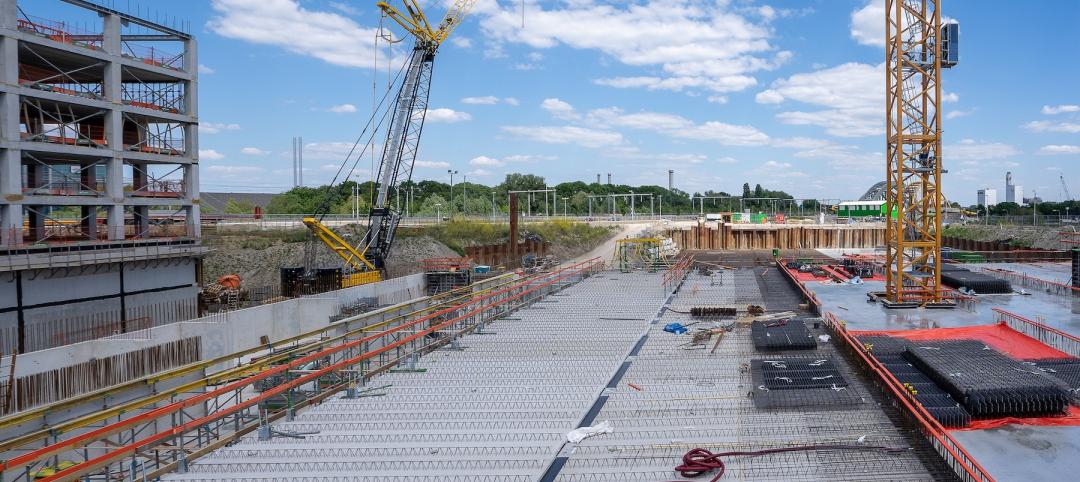At 32 stories, the B2 residential tower at Atlantic Yards near Brooklyn has been widely lauded as a bellwether for modular construction. But since construction started about 18 months ago, only five of the floors have been built—and developer Forest City Ratner Companies now has a Chinese partner that will move forward on the next three residential buildings, using conventional construction.
According to a report in the New York Times, Forest City Ratner's development partner, Greenland Holding Group, will now have a majority stake in the 22-acre Atlantic Yards mixed-use project. The Shanghai-based firm will oversee the next three residential tower projects, while Forest City Ratner continues to move forward with B2. Completion of the 348,000-sf modular tower, comprising 930 modules and 363 apartments, had been moved to late 2015, more than a year later than planned.
MaryAnne Gilmartin, Forest City Ratner's chief executive, says technical difficulties have been substantial, both at the nearby factory that's creating the modules and on the Atlantic Yards job site. “It’s been terribly frustrating," she told the New York Times. "But I don’t think this is a referendum on modular. The best way to prove that this works is to build B2.”
The Building Team for B2 includes Skanska, FC + Skanska Modular (a collaboration between Forest City Ratner and Skanska, which is building the components), SHoP, and Arup.
Related Stories
Justice Facilities | Oct 17, 2022
San Antonio’s new courthouse aims to provide safety and security while also welcoming the public
The San Antonio Federal Courthouse, which opened earlier this year, replaces a courthouse that had been constructed as a pavilion for the 1968 World’s Fair.
Market Data | Oct 14, 2022
ABC’s Construction Backlog Indicator Jumps in September; Contractor Confidence Remains Steady
Associated Builders and Contractors reports today that its Construction Backlog Indicator increased to 9.0 months in September, according to an ABC member survey conducted Sept. 20 to Oct. 5.
| Oct 13, 2022
Boston’s proposed net-zero emissions code has developers concerned
Developers have raised serious concerns over a proposed new energy code by the City of Boston that would require newly constructed buildings over 20,000 sf to immediately hit net-zero emissions goals.
Education Facilities | Oct 13, 2022
A 44-acre campus serves as a professional retreat for public-school educators in Texas
A first-of-its-kind facility for public schools in Texas, the Holdsworth Center serves as a retreat for public educators, supporting reflection and dialogue.
Building Team | Oct 12, 2022
Real estate development practices worsened impact of Hurricane Ian
A century ago, the southwest Florida coast was mostly swamps and shoals, prone to frequent flooding and almost impossible to navigate by boat.
Market Data | Oct 12, 2022
ABC: Construction Input Prices Inched Down in September; Up 41% Since February 2020
Construction input prices dipped 0.1% in September compared to the previous month, according to an Associated Builders and Contractors analysis of U.S. Bureau of Labor Statistics’ Producer Price Index data released today.
Hotel Facilities | Oct 12, 2022
Global hotel chain citizenM opens its first Chicago property and its fifth of the year
citizenM, a global chain of affordable luxury hotels, has opened its first Chicago property—its fifth opening of 2022.
Building Team | Oct 11, 2022
Associated Materials® Celebrates the Company’s Rich History, Which Began 75 Years Ago with the Founding of Alside
Since its inception in 1947, Alside® has been a leader in innovation and continues this very commitment to excellence – in people, products and services.
Standards | Oct 11, 2022
Peter Templeton named new USGBC and GBCI president and CEO
The U.S. Green Building Council (USGBC) and Green Business Certification Inc. (GBCI) appointed Peter Templeton as president and CEO.
Legislation | Oct 10, 2022
Chicago’s updated building energy code provides incentives for smart HVAC, water appliances
The Chicago City Council recently passed the 2022 Chicago Energy Transformation Code that is intended to align with the city’s goal of reducing carbon emissions by 62% from 2017 levels by 2040.


